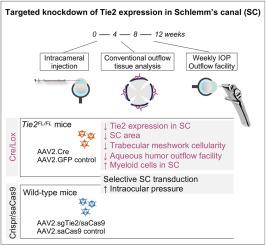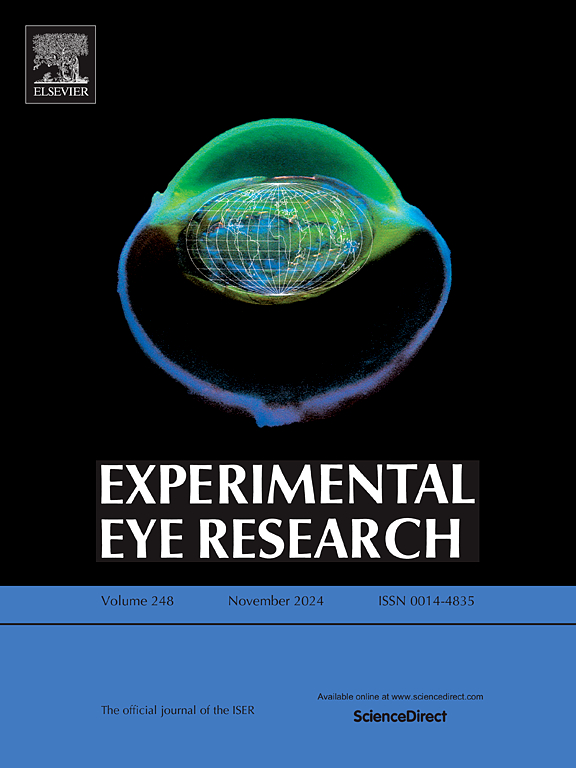Schlemm's canal-selective Tie2/TEK knockdown induces sustained ocular hypertension in adult mice
IF 3
2区 医学
Q1 OPHTHALMOLOGY
引用次数: 0
Abstract
Deficient Angiopoietin-Tie2 signaling is linked to ocular hypertension in glaucoma. Receptor Tie2/TEK expression and signaling at Schlemm's canal (SC) is indispensable for canal integrity and homeostatic regulation of aqueous humor outflow (AHO) and intraocular pressure (IOP), as validated by conditional deletion of Tie2, its ligands (Angpt1, Angpt2 and Angpt3/4) or regulators (Tie1 and PTPRB/VE-PTP). However, these Tie2/TEK knockouts and conditional knockouts are global or endothelial, preventing separation of systemic and ocular vascular defects that impact retinal or renal integrity. To develop a more targeted model of ocular hypertension induced by selective knockdown of Tie2/TEK expressed in SC, we combined the use of viral vectors to target the canal, and two distinct gene-editing strategies to disrupt the Tie2 gene. Adeno-associated virus (AAV2) is known to transduce rodent SC when delivered into the anterior chamber by intracameral injection. First, delivery of Cre recombinase via AAV2.Cre into R26 tdTomato/+ reporter mice confirmed preferential and stable transduction in SC endothelium. Next, to disrupt Tie2 expression in SC, we injected AAV2.Cre into homozygous floxed Tie2 (Tie2FL/FL) mice. This led to attenuated Tie2 protein expression along the SC inner wall, decreased SC area and reduced trabecular meshwork (TM) cellularity. Functionally, IOP was significantly and steadily elevated, whereas AHO facility was reduced. In contrast, hemizygous Tie2FL/+ mice responded to AAV2.Cre with inconsistent and low IOP elevation, corroborating the dose-dependency of ocular hypertension on Tie2 expression/activation. In a second model using CRISPR/SaCas9 genome editing, wild-type C57BL/6 J mice injected with AAV2.saCas9-sgTie2 showed similar selective SC transduction and comparable IOP elevation in course and magnitude to that induced by AAV2.Cre in Tie2FL/FL mice. Together, our findings, demonstrate that selective Tie2 knockdown in SC is a targeted strategy that reliably induces chronic ocular hypertension and reproduces glaucomatous damage to the conventional outflow pathway, providing novel models of SC-Tie2 signaling loss valuable for preclinical studies.

Schlemm's 管选择性 Tie2/TEK 敲除诱导成年小鼠持续性眼压升高。
血管生成素-Tie2 信号的缺失与青光眼的眼压过高有关。Tie2、其配体(Angpt1、Angpt2 和 Angpt3/4)或调节因子(Tie1 和 PTPRB/VE-PTP)的条件性缺失证实,施莱姆管(SC)受体 Tie2/TEK 的表达和信号传导对于施莱姆管的完整性以及房水外流(AHO)和眼压(IOP)的平衡调节是不可或缺的。然而,这些 Tie2/TEK 基因敲除和条件性基因敲除都是整体性的或内皮性的,无法将影响视网膜或肾完整性的全身性和眼部血管缺陷分开。为了开发一种更有针对性的眼压模型,通过选择性敲除在 SC 中表达的 Tie2/TEK 来诱导眼压,我们结合使用了病毒载体来靶向管,以及两种不同的基因编辑策略来破坏 Tie2 基因。众所周知,腺相关病毒(AAV2)通过巩膜内注射进入前房可转导啮齿动物的SC。首先,通过 AAV2.Cre 将 Cre 重组酶递送到 R26tdTomato/+ 报告小鼠体内,证实了在 SC 内皮中的优先和稳定转导。接下来,为了破坏Tie2在SC中的表达,我们将AAV2.Cre注射到同基因Tie2缺失(Tie2FL/FL)小鼠体内。这导致沿SC内壁的Tie2蛋白表达减弱、SC面积缩小以及小梁网(TM)细胞减少。在功能上,眼压显著且持续升高,而 AHO 设施则减少。相比之下,半杂合子 Tie2FL/+ 小鼠对 AAV2.Cre 的反应不一致,眼压升高较低,这证实了眼压升高对 Tie2 表达/激活的剂量依赖性。在第二个使用 CRISPR/SaCas9 基因组编辑的模型中,注射了 AAV2.saCas9-sgTie2 的野生型 C57BL/6J 小鼠表现出类似的选择性 SC 转导,眼压升高的过程和幅度与 AAV2.Cre 在 Tie2FL/FL 小鼠中诱导的眼压升高相当。总之,我们的研究结果表明,选择性敲除 SC 中的 Tie2 是一种有针对性的策略,它能可靠地诱导慢性眼压升高,并再现青光眼对传统流出通路的损害,为临床前研究提供了新的 SC-Tie2 信号缺失模型。
本文章由计算机程序翻译,如有差异,请以英文原文为准。
求助全文
约1分钟内获得全文
求助全文
来源期刊

Experimental eye research
医学-眼科学
CiteScore
6.80
自引率
5.90%
发文量
323
审稿时长
66 days
期刊介绍:
The primary goal of Experimental Eye Research is to publish original research papers on all aspects of experimental biology of the eye and ocular tissues that seek to define the mechanisms of normal function and/or disease. Studies of ocular tissues that encompass the disciplines of cell biology, developmental biology, genetics, molecular biology, physiology, biochemistry, biophysics, immunology or microbiology are most welcomed. Manuscripts that are purely clinical or in a surgical area of ophthalmology are not appropriate for submission to Experimental Eye Research and if received will be returned without review.
 求助内容:
求助内容: 应助结果提醒方式:
应助结果提醒方式:


